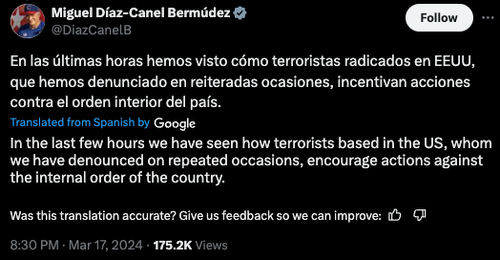A wave of anti-government protests, uprisings, and armed rebellions reminiscent of the 'Arab Spring' in the Middle East more than a decade ago is starting to emerge across the Caribbean region, triggered by the ascent of civil war in Haiti.
This past weekend, the latest uprising unfolded in Santiago, Cuba, about 800 kilometers (500 miles) from Havana. Hundreds of residents took to the streets, decrying hours-long power blackouts and food shortages.
🚨🇨🇺 PROTESTS BREAK OUT IN CUBA CHANTING "FREEDOM"pic.twitter.com/FYZbl7i8Dw
— Mario Nawfal (@MarioNawfal) March 18, 2024
🚨 CUBANS HIT STREETS AGAIN: FACING GHOSTS OF 2021’S BRUTAL CRACKDOWN
— Mario Nawfal (@MarioNawfal) March 18, 2024
Protests flare up in Cuba, recalling the grim aftermath of 2021 - over 1,400 detained, torture cases, and silenced artists. As tensions soar, global calls for action against Cuba’s human rights abuses… https://t.co/uAiybzgDYG pic.twitter.com/LMyRsgmujC
According to Reuters, Cuba has plunged into an "unprecedented economic crisis" in recent years, "stoking a record-breaking exodus that has seen upwards of 400,000 people migrate to the United States."
On X, Cuban President Miguel Díaz-Canel confirmed the social unrest:
"Several people have expressed their dissatisfaction with the situation of electrical service and food distribution.
"The disposition of the authorities of the Party, the State and the Government is to attend to the complaints of our people, listen, dialogue, explain the numerous efforts that are being carried out to improve the situation, always in an atmosphere of tranquility and peace."
Díaz-Canel then blamed anti-government "terrorists" based in the US for causing trouble:
On Facebook, the US Embassy urged the communist government to respect the protests:
"We are aware of reports of peaceful protests in Santiago, Bayamo, Granma and elsewhere in Cuba.
"We urge the Cuban government to respect the human rights of the protesters and attend to the legitimate needs of the Cuban people."
State-run media outlet CubaDebate said police had arrived in Santiago to "control the situation" and "prevent" further violence.
The key question is whether the uprising will spread, especially considering it's unfolding in America's backyard.

